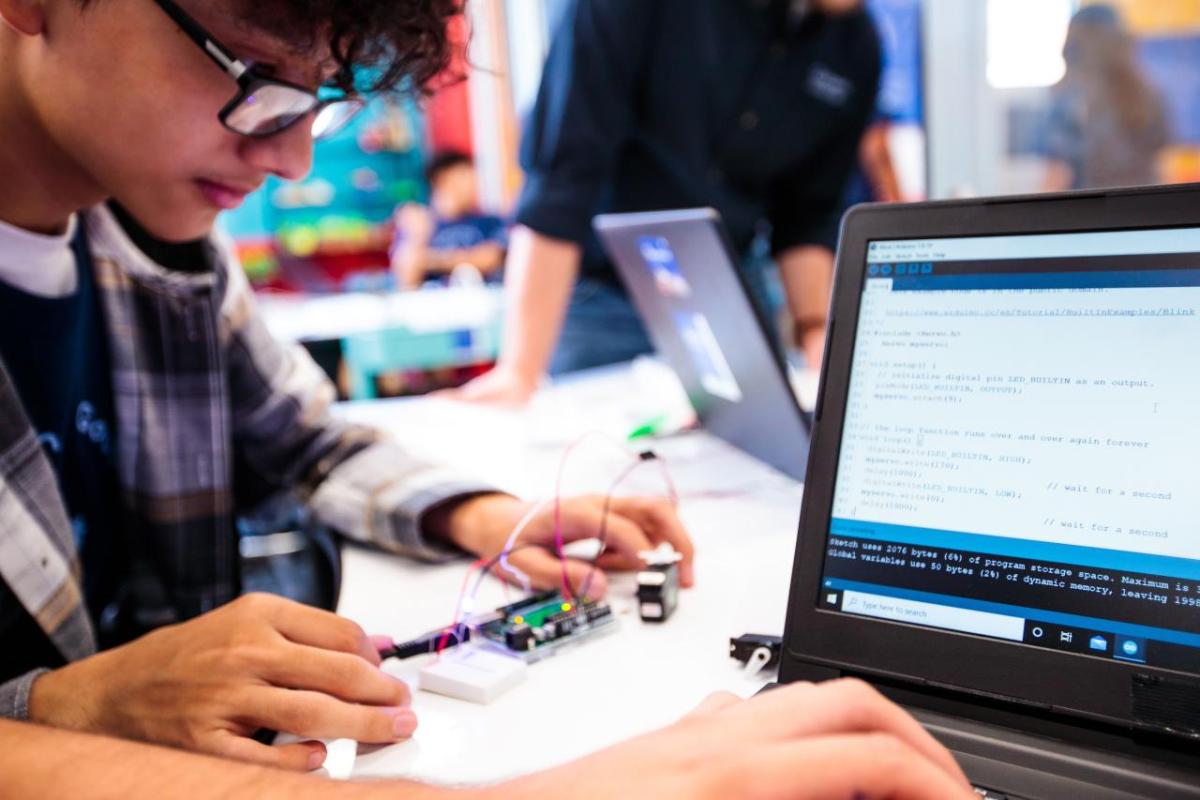Building Skills in Afterschool: STEM Next and Qualcomm, Inc. Lead the Way for Future Innovators
Published 02-28-24
Submitted by Qualcomm Inc.

In a rural town in New York, a 6th-grade boy has just finished working through the Engineering Design Process and reflects, “When I thought about engineering, I thought it was just building things, but I learned what a mechanical engineer did and now that’s what I want to be.”
Through the Qualcomm® Thinkabit Lab™, youth engage in hands-on activities to build circuits like electrical engineers, code like computer scientists, and build an invention prototype like mechanical engineers. Since 2014, the program has reached more than 100,000 youth across 24 school districts, universities, and nonprofits. Now, thanks to STEM Next and its Million Girls Moonshot, Qualcomm, Inc. is collaborating with afterschool and summer programs throughout the country.
In collaboration with Qualcomm, Inc. STEM Next leveraged the Thinkabit Lab curriculum and organized training with out-of-school time (OST) programs in New York, Indiana, and Wisconsin to provide students with a unique experience and exposure to STEM careers they may not have known existed. Of the students served, from seven different program sites, over half reported that they will continue to pursue a career in STEM.
The Thinkabit Lab also provides an opportunity for STEM educators to learn best practices for engaging student. Educators were trained by Qualcomm employees, supplied with accompanying STEM kits, and provided implementation and evaluation support throughout the process. The collaboration leverages the experiential learning environments found in OST and meaningfully integrates quality STEM programming with youth who need it most.
Areas with few STEM opportunities were prioritized in the Thinkabit Lab implementation, and the experiences did not disappoint. “As always when working with youth, those "lightbulb" moments are always great to see - once they (students) were able to successfully make the light blink or get the fan to spin, their pride was instant!” said a Wisconsin educator. “It was also cool to see some of the quieter kids step out of their shells and help others after they had gotten the hang of it.”
Near Clarkson University in New York, one dedicated teacher drove over 60 miles to a small rural town to teach the Thinkabit Lab curriculum. “It is worth the drive because I get to share my passion with young students who have never done stuff like this,” said the educator. “The greatest moment for me was when my students plugged in their Arduino (an open-sourced electronic prototyping platform), uploaded the code, and saw their LED blinking or servo moving. I could see their sense of accomplishment and pride in successfully doing the build and uploading the code, and it made me happy to see it come to fruition. I know it made them happy because I witnessed that “a-ha” moment in them. It was truly special.”
Skills building to overcome barriers is part of the Thinkabit Lab curriculum and has contributed to student and program success. In fact, 80% of the participating youth reported positive changes in their ability to persevere.[1]
“Many students were quick to frustration when they ran into a roadblock or error in their codes (in the world of instant gratification and information, this is normal for them). We had to do some extra coaxing to encourage them to continue to try instead of walking away - resilience is a trait we have been working extra hard on,” said the instructor.
The Thinkabit Lab program is paving the way for students to pursue a career in STEM, and resilience is part of that process. “I am excited every week and always wondering what we will get to build next, " says a 5th-grade girl in Wisconsin. Thanks to the Qualcomm, Inc. / STEM Next collaboration, she and thousands of other girls can continue to build a brighter future.
Learn more about the Thinkabit Lab and bring your students unique experiences and exposure to STEM careers.
Learn more about how Million Girls Moonshot is engaging millions of girls in STEM learning opportunities through afterschool and summer programs.
[1]PEAR’s Common Instrument Suite, validated self-report surveys that measure a variety of STEM-related attitudes. Data taken from Thinkabit Lab experience. Surveys were completed by youth (n=64) and educators (n=7) from BioBus Inc., Boys & Girls Club of Manitowoc County, and COA Youth & Family Centers.


